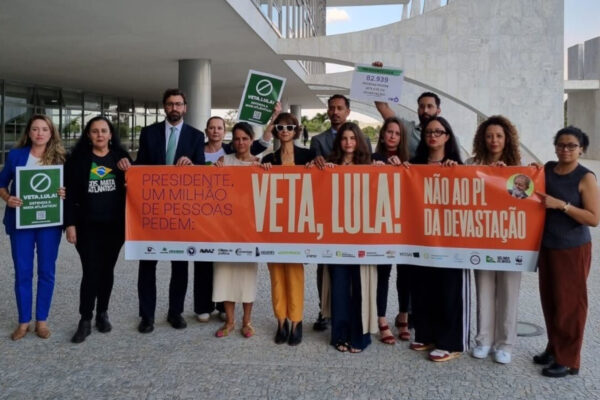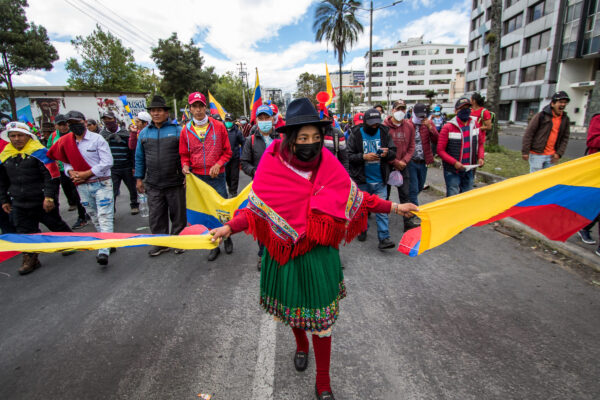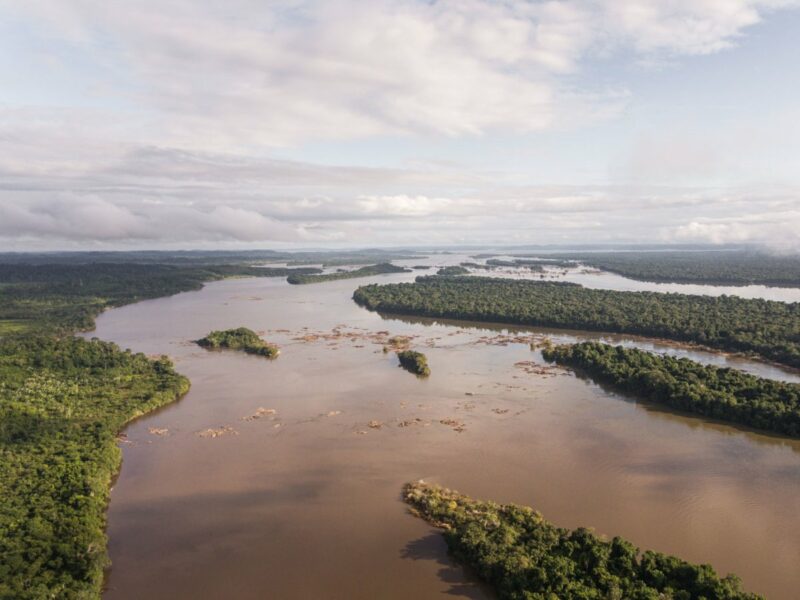The struggle for Indigenous rights in Brazil has reached a critical juncture as orchestrated attacks on their territorial claims intensify. Despite the Brazilian Supreme Court’s landmark decision in late 2023 declaring the Marco Temporal (“Time Limit”) legal thesis unconstitutional, anti-Indigenous factions, fueled by agribusiness and industrial mining interests, continue to push it forward.
These efforts, including a recent proposed amendment to the Constitution, threaten to undermine Indigenous land rights and accelerate environmental destruction in the Amazon. This growing threat not only endangers the cultural and physical existence of Indigenous peoples but also poses severe risks to the ecological stability of the Amazon rainforest, a vital biome for global climate regulation.
The Supreme Court’s ruling declaring Marco Temporal unconstitutional was the result of over a decade of Indigenous struggle and marked a significant victory for the movement. However, in recent months, anti-Indigenous factions, led by agribusiness and mining interests, have launched new offensives against Indigenous rights: one from the Senate, and another through the Supreme Court, which was formerly a critical ally in defense of democracy and Indigenous rights during the worst periods of the Bolsonaro administration.
Legislative assault: The Marco Temporal amendment
Last week, the Brazilian Senate’s Constitution and Justice Committee convened to vote on a proposed amendment to the Constitution which seeks to profoundly alter the fundamental land rights of Brazil’s Indigenous peoples. The amendment aims to rewrite Article 231 of the Constitution by incorporating the Marco Temporal thesis, thereby paralyzing pending Indigenous land demarcations and jeopardizing the legal status of existing Indigenous territories across the country.
However, due to an intense and organized mobilization by the Association of Brazil’s Indigenous Peoples (APIB) and allies across Indigenous territories, in Brasília, and on social media, the vote was postponed. This mobilization pressured the Lula administration to fulfill its promises to guarantee and advance land demarcation. As a result, Jacques Wagner, leader of the Lula’s party in the Senate, presented a collective request for more time to study the proposition, postponing the vote until October 30.
Judicial maneuvers: The Supreme Court’s role in the crisis
This result is a partial victory for the movement, providing more time to organize and resist. However, it falls short of resolving the defense of the Indigenous territorial rights. By postponing the vote, the Senate will now await the conclusion of a “reconciliation” process that was set up by Supreme Court Justice Gilmar Mendes, whose first meeting is scheduled for August 5. The Indigenous movement is closely monitoring these developments and has called for a national mobilization to defend Indigenous territorial rights on this date in Brazil’s capital, Brasília.
In 2023, Amazon Watch released a report featuring an interdisciplinary analysis from law, economics, anthropology, and climate science about the risks and rights violations associated with the Marco Temporal thesis.
“Our rights cannot be negotiated!”
The decision by Justice Mendes, known for his disregard for Indigenous rights, suggests that Brazil’s highest court is seeking a compromise between agribusiness and Indigenous peoples to “pacify” land demarcation claims. Mendes established the creation of a “special commission” made up of representatives from agribusiness, the federal government, states, municipalities, and Indigenous peoples to collectively “find the most stabilizing contextual meaning” of Indigenous constitutional rights. He also suspended consideration of the five legal actions challenging the constitutionality of the Marco Temporal thesis.
Many points of Mendes’ decision seem controversial. He established a process of “self-composition” for this special commission, which means it will be formed by representatives appointed by the diverse sectors with opposing interests, including agribusiness, which is one of the most influential and affluent economic sectors in Brazil. By doing this and expecting the commission could come to consensus, Justice Mendes ignores decades of violence that marks the offensives of the agribusiness sector against Indigenous peoples, as well as the profound asymmetries of power that exist between it and the Indigenous movement, a grassroots social movement made up of people fighting for their fundamental rights. Given these fundamental disparities and agribusiness’ active hostility to the rights of Indigenous peoples, agreement or reconciliation seems implausible.
Moreover, from a legal standpoint, Indigenous territorial rights are fundamental and non-negotiable. They cannot be bartered away, especially by those who stand to benefit from their destruction. APIB’s legal team emphasizes that several critical issues raised by the Indigenous movement have been overlooked by Mendes and should be addressed before any decision is made. Furthermore, the Indigenous movement was not involved in developing the special commission’s methodology.
Environmental impact: Threats to the Amazon rainforest
Justice Mendes’ decision also aims to benefit other economic sectors that have caused significant conflicts in Indigenous territories, including the mining industry. The industrial mining lobby has been pressuring the Supreme Court to open up Indigenous lands to mineral extraction for many years. In December 2023, at the time of the Marco Temporal ruling, Justice Dias Toffoli unexpectedly brought up the topic. Mendes reiterated this in his recent decision, emphasizing the need to regulate mineral exploration (and water resource exploitation needed for this activity) on Indigenous lands.
The APIB legal team issued a public statement:
“What is at stake in this negotiation is not just the Marco Temporal thesis, which has already been declared unconstitutional by the Supreme Court. The central issue of the negotiation process, initiated against the will of Indigenous peoples, is the authorization of economic exploitation of Indigenous lands through mining or agribusiness. APIB views the conduct of this process and the establishment of the special commission with great concern and believes that if carried out, Mendes’ proposed negotiation will represent one of the most significant violations of Indigenous rights in recent history.”
UN Special Rapporteur on the Rights of Indigenous Peoples, José Francisco Calí Tzay, reinforced the notion that Brazil must protect Indigenous peoples’ lands, territories, and resources by stating:
“I remind the Brazilian government that the lands and territories traditionally owned or occupied by Indigenous peoples are the defining elements of their identity, culture, and their relationship with ancestors and future generations. Opening the path to extractive policies solely for business interests will legitimize violence against Indigenous peoples and violate their rights to traditional lands, territories, and natural resources.”
Indigenous mobilization: Resistance and advocacy
APIB coordinators are currently debating whether to participate in the special commission, which could potentially negotiate and weaken Indigenous constitutional rights. If APIB decides to participate, Mendes has stipulated that one of the seven Indigenous representatives will speak for the national organization, while the others will represent the various institutions within APIB.
In response to this new attack, the Indigenous movement has decided to initiate a series of protests between now and August 5. Grassroots organizations, leaders, Indigenous youth, and allies are also called to Brasília in early August to protest Mendes’ proposed negotiation.
The Marco Temporal threat
Specifically, the Marco Temporal thesis establishes that the demarcation of Indigenous territories is contingent upon their occupation of the lands claimed at the time that Brazil’s Constitution was adopted in 1988. This thesis disregards the history of severe violence and expulsions that many Indigenous peoples suffered before 1988. If approved, it would effectively legalize centuries of ethnocide and genocide against Indigenous peoples in Brazil, whose physical and cultural existence fundamentally depends on their lands.
Furthermore, Marco Temporal would allow the government to establish military bases, roads, energy projects, and more within Indigenous territories without consulting affected communities and even against their will. It also permits non-Indigenous economic activities to operate without community consent, which represents a grave threat to the environment. Indigenous lands are the most environmentally protected areas in the country, playing a crucial role in protecting biomes, maintaining vital ecosystems, preserving forests, water resources, and biodiversity, and regulating rainfall.
The urgency of international solidarity
The current legislative and judicial maneuvers underscore a broader, more insidious threat to Indigenous rights and environmental protection in Brazil. The ongoing attempts to push the Marco Temporal thesis and other pro-extractive policies signal a potential rollback of decades of progress. Indigenous communities, their allies, and organizations like Amazon Watch are mobilizing to resist these threats and advocate for stronger protections and recognition of Indigenous territories.
As Brazil stands at a crossroads, the international community’s support and vigilance are crucial in ensuring that Indigenous rights are upheld and the Amazon rainforest is preserved for future generations.














